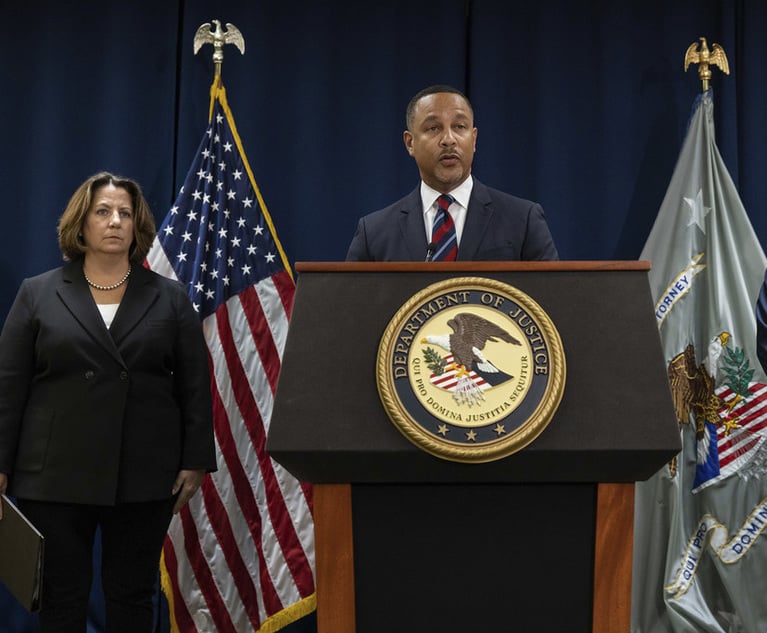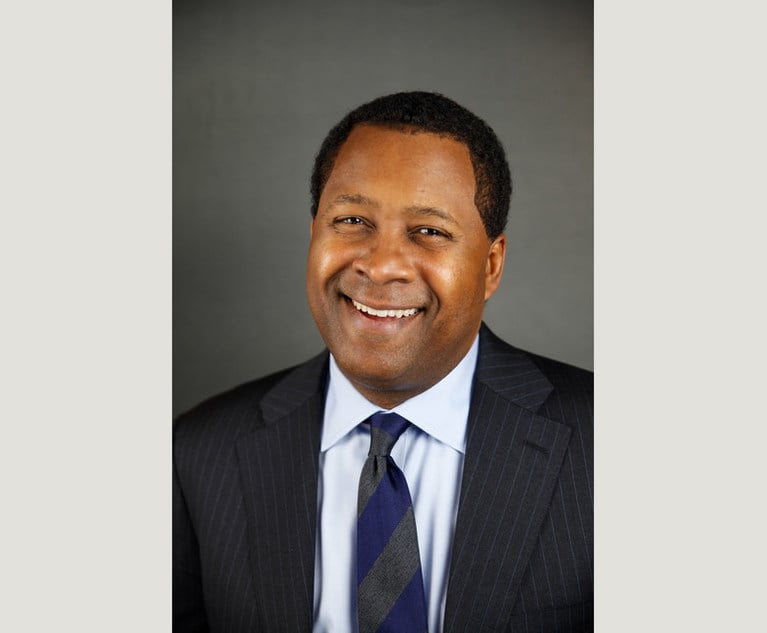Ex-Deputy AG's Bid to Represent Huawei Under Scrutiny. Plus: Feds Getting Ready for Probes of Big Tech
The DOJ is doubling down on its claim that James Cole's role in an investigation during his tenure as the department's second-ranking official should prevent him from representing the Chinese tech behemoth
June 04, 2019 at 10:01 PM
8 minute read
Good evening from Washington—and welcome to Compliance Hot Spots, our roundup and analysis of regulatory and enforcement trends. Tips, feedback and general thoughts on your practices always appreciated. I'm your host, C. Ryan Barber. Reach me at [email protected] and 202-828-0315, or follow me on Twitter @cryanbarber.

An 'Unprecedented' Conflict For a Former Deputy AG Now Defending Huawei (Or Trying To)
Federal prosecutors are resisting Huawei's request for more detail about why the Justice Department believes Sidley Austin partner James Cole, a former deputy attorney general, should be disqualified from defending the Chinese telecom giant against charges it violated U.S. sanctions against Iran.
In a letter to Judge Ann Donnelly this week, the Justice Department doubled down on its claim that Cole's role in an investigation during his tenure as the second-ranking U.S. Justice Department should prevent him from representing Huawei. Cole's participation in that past investigation, which was not specified in the DOJ's heavily-redacted court papers, has created an “unprecedented” conflict of interest as he now seeks to defend Huawei, prosecutors wrote Monday.
“The government is not aware of any situation in which a former DAG—or other senior DOJ official—has attempted to represent a client when he had previously been involved in a substantially related matter while serving as DAG, let alone when the former representation involved classified information,” prosecutors wrote.
Cole did not respond to a request for comment.
Huawei's defense lawyers have argued that the Justice Department has not adequately explained its basis for seeking Cole's disqualification. Last month, the company argued that the “government apparently believes that it need reveal nothing to Huawei about the basis for stripping Huawei of its counsel.”
In its response Monday, the Justice Department said it had provided Huawei with “the extent of the information that could be revealed without providing some of the very information the government seeks to prevent from being used improperly.”
 Matthew McGill (Photo: Diego M. Radzinschi/ALM)
Matthew McGill (Photo: Diego M. Radzinschi/ALM)Who Got the Work
➤ Gibson, Dunn & Crutcher partner Matthew McGill represented NeoPollard Interactive, the technology provider for New Hampshire's online lottery system, in a successful challenge to the Justice Department's reversal of a 2011 legal opinion that had paved the way for the growth of online gambling. In late 2018, the Justice Department issued a new legal opinion in which it adopted the view that a federal law called the Wire Act prohibits all online gambling, not just sports betting. McGill, reacting to a federal judge's rejection of that new opinion, said: “Throughout the country, “ he said, “state lotteries and others in the gaming industry once again can rely on the Justice Department's 2011 opinion that the Wire Act is limited to sports betting.”
➤ Rebecca Katz, senior counsel at Motley Rice, represented a pair of whistleblowers who will split a $3 million award for helping the Securities and Exchange Commission bring a successful enforcement action. Katz previously served as a senior counsel in the SEC's enforcement division. Announcing the $3 million award, the SEC trumpeted her clients' efforts to flag misconduct internally before coming to federal regulators.
➤ Sidley Austin partner Barry Rashkover helped a Colorado-based investment adviser, Deer Park Road Management Company, reach a $5 million settlement with the Securities and Exchange Commission resolving allegations that the fund manager failed to maintain policies to ensure securities were properly valued in its flagship fund. The fund manager's chief investment officer, Scott Burg, agreed to pay a $250,000 penalty to settle claims that he approved valuations of assets that traders had flagged as “undervalued.” Burg was represented by Gibson Dunn partner Mark Schonfeld.
“Valuation of client assets is a critically important area for investment advisers,” said Daniel Michael, chief of the SEC enforcement division's complex financial instruments Unit. “Deer Park's pervasive compliance failures allowed its traders to mark assets up gradually instead of marking them to market, in violation of the accounting principles they were required to follow.”
➤ Cooley's Patrick Gibbs is defending Kik Interactive Inc. against allegations that it illegally raised $100 million through a 2017 sale of digital tokens. The SEC alleged that Kik, after losing money for years on an online messaging application, raised more than $55 million by selling a digital token called Kin without making the proper disclosures.
“Companies do not face a binary choice between innovation and compliance with the federal securities laws,” said Steven Peikin, co-head of the SEC's enforcement division, announcing the lawsuit filed in the U.S. District Court for the Southern District of New York. Bloomberg has more on the lawsuit here.

Compliance Corner: Stories I'm Reading
➤ Google's Scrutiny by Justice Department Has Been Building. “The Justice Department's plans to investigate Alphabet Inc.'s Google have been building over time, amid a growing public conversation about whether the government should do more to scrutinize the handful of giant tech firms that dominate the U.S. landscape. The department's antitrust division and the Federal Trade Commission, which share federal antitrust enforcement authority, have sent a variety of signals that they were eager to explore cutting-edge questions about how big tech is affecting the competitive landscape.” [WSJ]
➤ A Former Business Partner Alleges the Trumps Evaded Taxes in Panama. “The owners of a luxury hotel in Panama City that ousted the Trump Organization as property managers last year accused it on Monday of evading taxes in Panama and creating a 'false light' around the hotel's finances.” [NYT]
➤ New Survey Shows Financial Institutions Still Losing the War on Money Laundering. “A new compliance survey of financial executives reveals that while most financial firms rated themselves as being effective at anti-money laundering, some 30 percent rated at least one of their anti-money laundering components as being either 'not at all effective' or only 'somewhat effective.'” [CorporateCounsel]
➤ Effective Cybersecurity and Data Protection Legislation Should Protect Whistleblowers. In the wake of a barrage of shocking revelations about data breaches and companies mishandling of customer data, a bipartisan consensus has emerged in support of legislation to give consumers more control over their personal information, require companies to disclose how they collect and use consumer data, and impose penalties for data breaches and misuse of consumer data. The Federal Trade Commission has been held out as the best agency to implement this new regulation. But for any such legislation to be effective, it must protect the courageous whistleblowers who risk their careers to expose data breaches and unauthorized use of consumers' private data,” the whistleblower lawyers Jason Zuckerman and Dallas Hammer write on NYU School of Law's Compliance & Enforcement blog.

Notable Moves and Announcements
➤ Two white-collar defense partners from Blank Rome in New York, including Carlos Ortiz, the former head of its white-collar and investigations practice, have decamped to Norton Rose Fulbright. Ortiz and Mayling Blanco told my colleague Jack Newsham that a client conflict played a role in their decision to leave Blank Rome. Ortiz said he left his position as chair of Blank Rome's white-collar defense and investigations group May 1 and was replaced by Jerry Bernstein and Gregory Linsin.
➤ Kevin Edgar, former chief counsel to the House Financial Services Committee, has joined BakerHostetler as counsel on its federal policy team. “Kevin is one of the most well-connected and knowledgeable people in Washington and has played a core role in shaping the financial regulatory world as we know it today,” said former Rep. Michael Ferguson, who leads BakerHostetler's federal policy team.
➤ Eversheds Sutherland has hired Sarah Paul as a litigation partner in New York. Paul was most recently an assistant U.S. attorney for the Southern District of New York in the criminal division.
➤ Reed Smith has brought on Christine Trent Parker as a partner in the firm's New York office. Parker joins from Sullivan & Cromwell, where she focused on commodities, futures and derivatives, and capital markets.
➤ Cory Flashner, formerly regional head of North America anti-money laundering and sanctions at Boston-based State Street, has joined Mintz as a member.
➤ Eric Beste and Charles La Bella have joined Barnes & Thornburg's San Diego office as members of the firm's litigation department and white-collar and investigations practice. Beste, a partner, joins from the U.S. Attorney's Office for the Southern District of California, where he was serving as senior litigation counsel. La Bella, of counsel, previously practiced at the California boutique Bartko Zankel Bunzel & Miller.
➤ Kevin Zerrusen, a 30-year veteran of the Central Intelligence Agency, has joined the Securities and Exchange Commission as a senior cybersecurity advisor to Chairman Jay Clayton. Zerrusen currently serves as chairman of the Intelligence National Security Alliance's Cyber Council, a group chartered to promote effective public-private sector collaboration on cybersecurity issues.
This content has been archived. It is available through our partners, LexisNexis® and Bloomberg Law.
To view this content, please continue to their sites.
Not a Lexis Subscriber?
Subscribe Now
Not a Bloomberg Law Subscriber?
Subscribe Now
NOT FOR REPRINT
© 2025 ALM Global, LLC, All Rights Reserved. Request academic re-use from www.copyright.com. All other uses, submit a request to [email protected]. For more information visit Asset & Logo Licensing.
You Might Like
View All
Compliance Hot Spots: GOP Eyes ESG as an Antitrust Issue + Another DOJ Crypto Seizure + Sidley Partner Jumps to Main Justice
9 minute read
Compliance Hot Spots: Lessons from Lafarge + Fraud Section Chief Talks Compliance + Cravath Lands FTC Commissioner
11 minute readTrending Stories
- 1Ex-Starbucks GC Exiting Latest Role, Will Get Severance
- 2Family Law Special Section 2025
- 3We Must Uphold the Rights of Immigrant Students
- 4Orrick Picks Up 13-Lawyer Tech, VC Group From Gunderson Dettmer
- 5How Alzheimer’s and Other Cognitive Diseases Affect Guardianship, POAs and Estate Planning
Who Got The Work
J. Brugh Lower of Gibbons has entered an appearance for industrial equipment supplier Devco Corporation in a pending trademark infringement lawsuit. The suit, accusing the defendant of selling knock-off Graco products, was filed Dec. 18 in New Jersey District Court by Rivkin Radler on behalf of Graco Inc. and Graco Minnesota. The case, assigned to U.S. District Judge Zahid N. Quraishi, is 3:24-cv-11294, Graco Inc. et al v. Devco Corporation.
Who Got The Work
Rebecca Maller-Stein and Kent A. Yalowitz of Arnold & Porter Kaye Scholer have entered their appearances for Hanaco Venture Capital and its executives, Lior Prosor and David Frankel, in a pending securities lawsuit. The action, filed on Dec. 24 in New York Southern District Court by Zell, Aron & Co. on behalf of Goldeneye Advisors, accuses the defendants of negligently and fraudulently managing the plaintiff's $1 million investment. The case, assigned to U.S. District Judge Vernon S. Broderick, is 1:24-cv-09918, Goldeneye Advisors, LLC v. Hanaco Venture Capital, Ltd. et al.
Who Got The Work
Attorneys from A&O Shearman has stepped in as defense counsel for Toronto-Dominion Bank and other defendants in a pending securities class action. The suit, filed Dec. 11 in New York Southern District Court by Bleichmar Fonti & Auld, accuses the defendants of concealing the bank's 'pervasive' deficiencies in regards to its compliance with the Bank Secrecy Act and the quality of its anti-money laundering controls. The case, assigned to U.S. District Judge Arun Subramanian, is 1:24-cv-09445, Gonzalez v. The Toronto-Dominion Bank et al.
Who Got The Work
Crown Castle International, a Pennsylvania company providing shared communications infrastructure, has turned to Luke D. Wolf of Gordon Rees Scully Mansukhani to fend off a pending breach-of-contract lawsuit. The court action, filed Nov. 25 in Michigan Eastern District Court by Hooper Hathaway PC on behalf of The Town Residences LLC, accuses Crown Castle of failing to transfer approximately $30,000 in utility payments from T-Mobile in breach of a roof-top lease and assignment agreement. The case, assigned to U.S. District Judge Susan K. Declercq, is 2:24-cv-13131, The Town Residences LLC v. T-Mobile US, Inc. et al.
Who Got The Work
Wilfred P. Coronato and Daniel M. Schwartz of McCarter & English have stepped in as defense counsel to Electrolux Home Products Inc. in a pending product liability lawsuit. The court action, filed Nov. 26 in New York Eastern District Court by Poulos Lopiccolo PC and Nagel Rice LLP on behalf of David Stern, alleges that the defendant's refrigerators’ drawers and shelving repeatedly break and fall apart within months after purchase. The case, assigned to U.S. District Judge Joan M. Azrack, is 2:24-cv-08204, Stern v. Electrolux Home Products, Inc.
Featured Firms
Law Offices of Gary Martin Hays & Associates, P.C.
(470) 294-1674
Law Offices of Mark E. Salomone
(857) 444-6468
Smith & Hassler
(713) 739-1250










